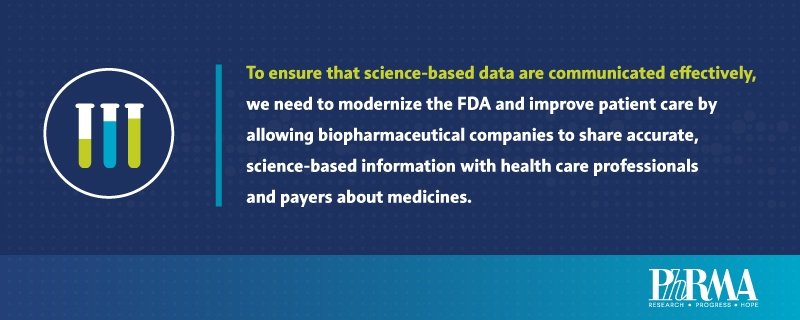
Yesterday, the U.S. Food and Drug Administration (FDA) announced a two-day hearing slated for November 9 and 10, seeking public input as the agency works to review and potentially revise its policies on communications between biopharmaceutical companies, payers and health care providers that govern responsible information-sharing about medicines.
More than ever, in a data-driven health care ecosystem, all parties want science-based information about the safety, effectiveness and complete value of treatments available for patients. Unfortunately, the FDA’s current federal regulations governing information-sharing about medicines have not kept up with this new reality.
To advance 21st century medicine, FDA’s regulatory framework needs to be modernized to reflect the rapidly evolving science and increased pace of the development and understanding of innovative medicines. Many types of data and analyses can benefit patient care, including rare disease populations, patients who participate in large registries and all of us who expect that our health care professionals and insurance companies will have access to timely, high-quality information that is accurately presented.
Recently, PhRMA and BIO released joint Principles on Responsible Sharing of Truthful and Non-Misleading Information About Medicines with Health Care Professionals and Payers, which illustrate how greater sharing of information between biopharmaceutical companies, payers and health care professionals can benefit patient care. The principles are a starting point for the FDA as it considers modernizing its regulations.

The following are three key concepts of the PhRMA and BIO principles:
- Commitment to Science-Based Communication: There are many types of data and analyses that are scientifically and statistically-sound, and which can help improve patient care. We must increase access to these types of communications.
- Commitment to Provide Appropriate Context About Data: Communications should clearly disclose appropriate contextual information about data that are presented, including limitations on statistical methods and study design, to ensure that health care professionals and payers are clearly informed about emerging data on the safety, effectiveness and value of medicines.
- Commitment to Tailoring Communications to the Intended Audience: Communications should keep the sophistication of the intended audience in mind to ensure that new information is clearly communicated and incorporated into existing knowledge and expertise.
Leading health care voices are echoing the need for the FDA to modernize its regulations. The Network for Excellence in Health Innovation released an issue brief describing how real-world evidence can help accelerate innovation and transform patient care. And stakeholders participating in an Academy of Managed Care Pharmacy forum in March agreed on a variety of recommendations to make it easier for pharmaceutical companies to share important pharmacogenomic information with health care organizations making coverage choices.
PhRMA looks forward to participating in the hearing, and we hope that the agency will act expeditiously to modernize its regulations in this important area.
To read PhRMA and BIO’s joint principles on communications with health care professionals and payers, go to: http://phrma.org/sites/default/files/pdf/information-sharing-with-hcps-principles-report.pdf.





